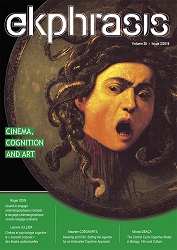The Control Cycle Cognitive Model in Biology, Film and Culture
The Control Cycle Cognitive Model in Biology, Film and Culture
Author(s): Mircea Valeriu DeacaSubject(s): Cognitive Psychology, Film / Cinema / Cinematography
Published by: Universitatea Babeş-Bolyai, Facultatea de Teatru si Televiziune
Keywords: film; control cycle; cognitive model; metaphor; metonymy; narration; Bayesian inference; categorization; attention schema
Summary/Abstract: The focus of the present study is the Control Cycle (CC), a seldom discussed cognitive model that is yet to be applied in film theory. The CC is grounded in bodily experience and is related to image-schematic thinking. TheCC is based upon the Tension Cycle, consisting of four successive stages: an initial stage of relaxation; next a stage, tension followed up by a force-dynamic event which releases the built-up pressure; and finally, resulting from the event, another stage of relaxation. The proposal of this article is that the CC takes a wide array of manifestations in biological cycles, brain processes, epistemic and cognitive phenomena, vision, culture, linguistic predication, and semantic constructions. Cinematic conceptualizations are no exceptions. Editing constructions, camera movement, conceptual metaphor and metonymy, emotion mechanics, narrative interest and narrative absorption instantiate the phases of the Control Cycle.
Journal: Ekphrasis. Images, Cinema, Theory, Media
- Issue Year: 20/2018
- Issue No: 2
- Page Range: 63-97
- Page Count: 34
- Language: English

